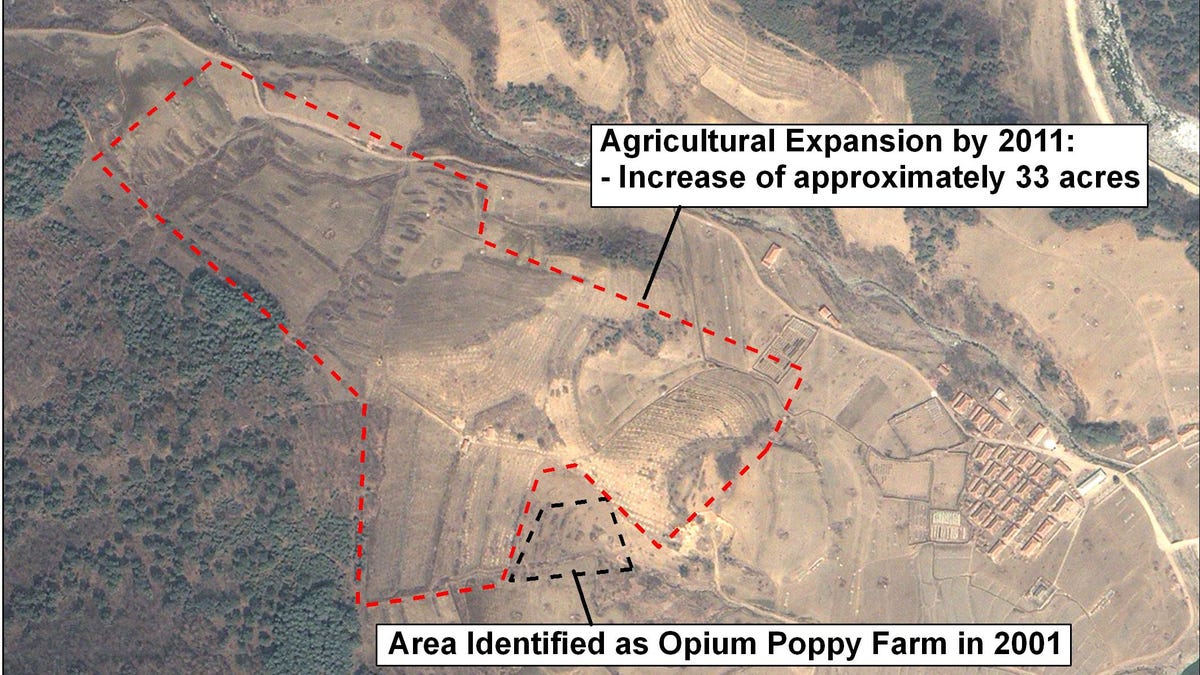
Outside the Yodok Prison camp agricultural areas previously identified as poppy fields for the production of opium and heroin have been greatly expanded. (DigitalGlobe)
Pinched by tightening economic sanctions and faced with what might become a contentious transition of power, North Korea is ramping up production of one of its key foreign currency generators -- heroin.
When satellite photos were released last week by Amnesty International showing the rogue nation’s prison camp system, some analysts were surprised by the expansion of agricultural lands around the camps.
“What was really surprising,” one satellite analyst, who studied the images but asked not to be identified, said, “was how farming acreage on the land around the Yodok camp had expanded. These are poppy fields and have been since we first looked at the camp in 2001.”
That assessment was underscored by Chuck Downs, executive director of the Committee for Human Rights in North Korea, who said that the regime's military, which runs the camps and the nation’s illicit heroin production, “do not allow food production by prisoners because they would steal it. They would rather grow drugs.”
Most analysts agree that the expansion of the drug-producing fields is a sign of a regime in deep economic trouble.
Downs said that the increase is the result of the bite of trade sanctions that are beginning to devastate the nation's economy and the need to quickly replace the hard currency lost to sanctions.
Of particular importance to the regime was the sale of missiles and arms abroad, which accounted for a large proportion of foreign income, but the 2006 trade embargo has vastly curtailed those sales.
The lack of foreign currency, he said, was also having its impact internally.
"The regime uses the money to distribute to party members to give them a sense of well being, usually in the form of gifts like color televisions. Last September a huge party meeting was surprisingly delayed because gifts that had been purchased from China, with foreign currency, had not arrived.”
Just how big the North Korean production of heroin has become is astonishing, according to analysts and intelligence reports, and has been largely overlooked as the international community focused on a bigger issue-- the sale of nuclear materials and technology. “It has gotten surprisingly little attention in the last ten years," according to Bruce Bennett of the RAND corporation.
Because of the secrecy of the regime there are no firm figures on drug profits, but estimates put the earnings on exports of heroin from $500 million to $1 billion annually.
“To put that in context,” Bruce Klingner, a senior fellow at the Heritage Foundation, pointed out that “the total for legitimate exports is estimated at around $1 billion annually.”
North Korea first turned to large scale heroin production in the mid 1990s when the nation’s manufacturing sector collapsed. Kim Jong Il, the nation’s dictator, decided that the heroin was the quicker way to make up for the export losses and ordered all collective farms to dedicate 12 acres to poppy production.
Since then, according Klingner, production has seesawed depending on the success of other exports, like missiles. Even more startling than the state’s involvement in heroin production is its use of its diplomatic corps to beat customs inspections in order to distribute the heroin.
Over the past dozen years more than 50 Korean diplomats or other state workers have been caught carrying drugs into more than 20 countries, according to a Congressional Research Service report.
In 1977, for example, Venezuela expelled the entire North Korean embassy for drug dealing. In 1993 Australia intercepted a North Korean vessel, the Pongsu, carrying $50 million worth of heroin into a port near Melbourne. More recently, North Korean diplomats in China, Russia, Japan and other countries have been found carrying or trying to sell heroin and have been expelled.
According to Klingner, one of the reasons that happens is that foreign embassies for the regime get no state funding for their legations.
“Diplomats are expected to fund themselves,” he said. “And this is one way they do it.”
He also said that because the United States has cut diplomatic relations with North Korea there have not been any incidents in the U.S.
Defectors from the North, including state security officials, say that as the heroin production soared, the regime used its diplomats not only to import the drugs, but to form alliances with organized crime groups overseas including the Russian Mafia and Japan’s Yakuza. This is allowing them to expand production even more, ensuring that their heroin reaches every corner of the world.
